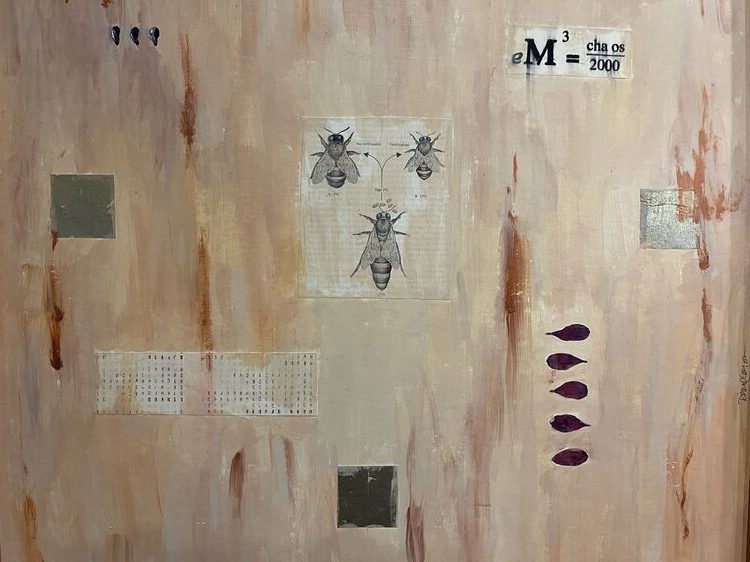 Diane Corson, Chaos Over Two Thousand
Diane Corson, Chaos Over Two Thousand
Night Writing
God’s eternal glory could not be described even if the heavens were parchment, and the forests quills; if all the seas were ink… ~Rabbi Meir bar Yitzhak
I work my way across the bed
from left to right. It’s funny
how quickly you move into available
space, filling it with something.
I reach the other side and half-awake
return like an old typewriter carriage
transcribing a story I can’t tell
in the daylight. How long have I done this?
Back and forth across the bed, writing
and re-rewriting a narrative
written on my body, pressed onto sheets.
If all the seas were ink, this ocean
would be my home, where I come to float
and sink and drown in the pre-dawn hours—
only rising when the ink is dry and already
fading. I can’t read my own words, my story
is a mystery to me, so how can I know yours?
And yet, I find myself just below
the surface, breathing the ink,
listening for the sound of nouns
and neutrons colliding, universes
forming in and around me. I move back
and forth across the bed, my body
is ink ash and black hole, the vessel
of your story that asks every night
where am I written?
________________________________
Nadine Ellsworth-Moran
Review by Mary Giudice
This is an alluring and mysterious poem… I don’t remember ever reading one quite like it!
Before I saw the epigraph I thought of a hymn we sing at church:
“Could we with ink the ocean fill,
And were the skies of parchment made;
Were every stalk on earth a quill,
And every man a scribe by trade;
To write the love of God above
Would drain the ocean dry…”
But this is a very bodily poem– the body as a weight pressing the words on the page of the sheets. It has a dreamy element, like some of this is happening unconsciously, there’s a quest for meaning, narrative, identity. I also think of the psalms of lament, written as though from a bed of despair. But this poem has much more of a coolness to it, even an underwater feel because of all the sea/ocean references. I especially like “I reach the other side and half-awake/return like an old typewriter carriage/ transcribing a story I can’t tell/ in the daylight…” Night is special, and this poem captures that. If I leave mildly bewildered it feels like a testament to the poet’s ability to bring the reader into synchronicity with the speaker.
Review by Anastasia Vassos
Evocative epigraph. I love these two questions: “How long have I done this?” and “where am I written?” A poetry teacher once advised “don’t ask a question in a poem that you know the answer to.” It is these questions that for this reader are at the heart of the poem. There is a third question “so how can I know yours?” meaning your story. We all know the answer to that. This line may have better served the poem as a statement. Night Writing conveys the mystery and beauty of writing, the questions we, as writers, demand of ourselves, the haziness and clarity of that liminal space in the bed, at night at daybreak. The ocean, the night, the bed, the body, the vessel – all gently rocking. Beautiful poem.
